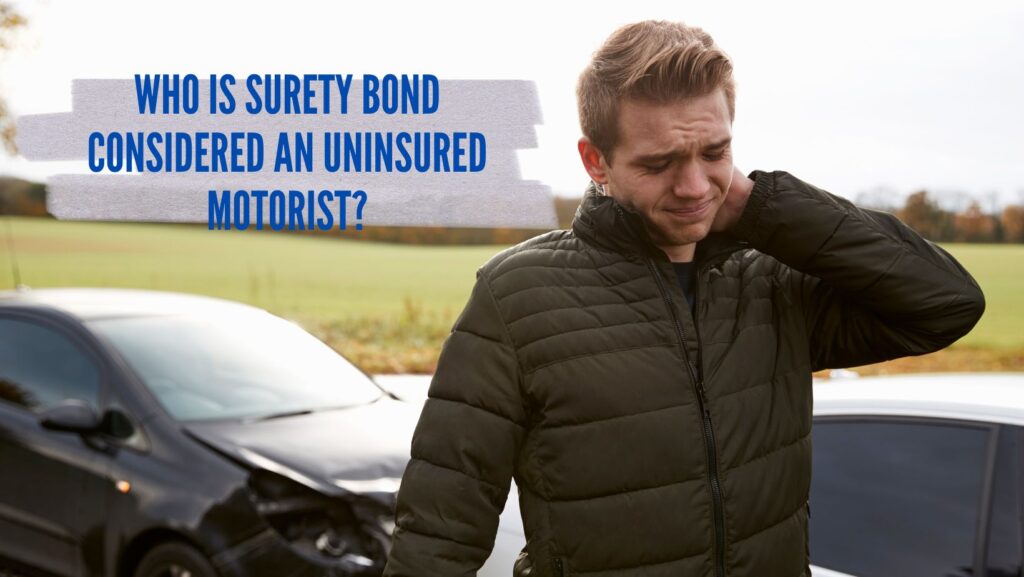Who is Surety Bond considered an uninsured motorist?
If you are in an accident and the other driver is considered uninsured, your insurance company will step in to cover the costs. However, what if you are in an accident and the other driver is considered a surety bond? Who pays for the damages then? In this blog post, we will discuss who is considered an uninsured motorist when it comes to surety bonds.

What is a surety bond for motorists?
A surety bond for motorists is a guarantee by an insurance company that the motorist will be financially responsible for any damages or injuries caused in an accident. It provides additional protection to both parties involved and can hold a driver accountable if they are found liable.
Who is surety bond considered an uninsured motorist?
In the context of surety bonds, an uninsured motorist is a driver who does not have adequate liability insurance coverage to cover the costs of damages or injuries caused in an accident. This includes drivers who don’t have any insurance at all, as well as those who may only have minimum liability coverage. In such cases, the surety bond would kick in to cover the damages, up to the full value of the bond.
How are surety bonds different from insurance?
Surety bonds are fundamentally different from insurance. Insurance is a contract between the policyholder and the insurer, where the insurer agrees to pay for any losses that occur due to an insured event. With surety bonds, however, there is no contract between the two parties. Instead, the surety bond company guarantees payment of any claims on behalf of the motorist, up to the full value of the bond. This makes surety bonds an effective way to protect both parties involved in a car accident.
Which of the following would not be covered by uninsured motorist coverage?
Uninsured motorist coverage typically covers damages or injuries caused by a driver who does not have sufficient liability insurance. It would not cover losses that result from surety bonds, as these are not considered to be forms of insurance.
Types of Uninsured Motorist Coverages
Uninsured motorist coverage is typically divided into two categories: bodily injury and property damage. Bodily injury coverage pays for medical expenses, lost wages, and other damages that result from an accident with an uninsured driver. Property damage coverage pays for repairs or replacement of damaged property caused by the same type of event. Depending on the state you live in, you may be able to purchase separate policies for either type of coverage.
What should uninsured motorists do to obtain a surety bond?
If you are an uninsured motorist, you may be able to obtain a surety bond from your insurance company. In most cases, the cost of the bond will depend on various factors such as the value of your vehicle and the amount of coverage you wish to purchase.
What is the cost of the surety bond for motorists?
The cost of a surety bond for motorists can vary depending on the amount of coverage required, the value of the vehicle, and the insurer providing the bond. Generally speaking, the cost of a surety bond will range from several hundred dollars to several thousand dollars. It is important to note that most insurers require payment upfront before they will issue a surety bond. Additionally, insurers may also require additional documentation, such as proof of vehicle registration and proof of liability insurance.
What is a surety bond claim from motorists?
A surety bond claim from motorists is a request for payment from the surety bond company. It typically occurs when an uninsured driver causes an accident that results in damages or injuries to another person. The claimant must provide proof of their losses, as well as evidence that the uninsured motorist was responsible for the accident and failed to provide sufficient insurance coverage. The surety bond company then evaluates the claim and determines how much it will pay out.
Can a motorist obtain a surety bond with bad credit?
Yes, a motorist can obtain a surety bond with bad credit. However, the cost may be higher than if the driver had good credit. The insurer will consider factors such as the amount of coverage required, the value of the vehicle, and the driver’s credit history when determining how much to charge for a surety bond. It is important to note that the surety bond company may also require additional documentation and information if they deem it necessary.
What are the requirements for motorists to obtain a surety bond?
To obtain a surety bond, motorists must meet certain requirements. These can vary depending on the state and insurer, but typically include proof of registration, liability insurance coverage, and financial responsibility. The motorist will also need to provide information about the vehicle they wish to insure, including its make and model as well as any modifications or add-ons. Lastly, the motorist may need to submit a valid driver’s license, proof of income and residence, and proof of creditworthiness.